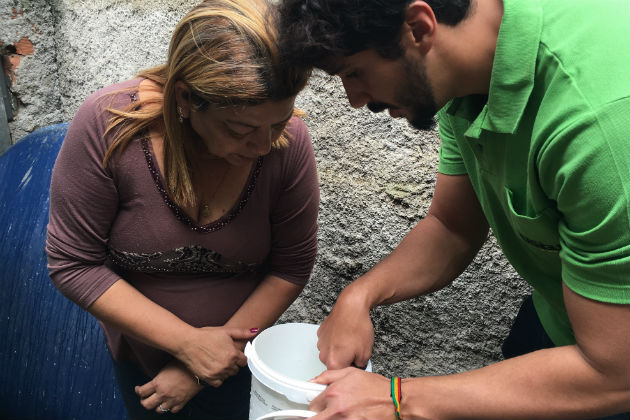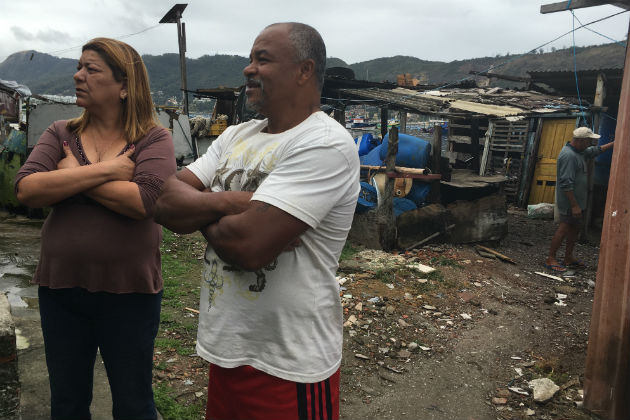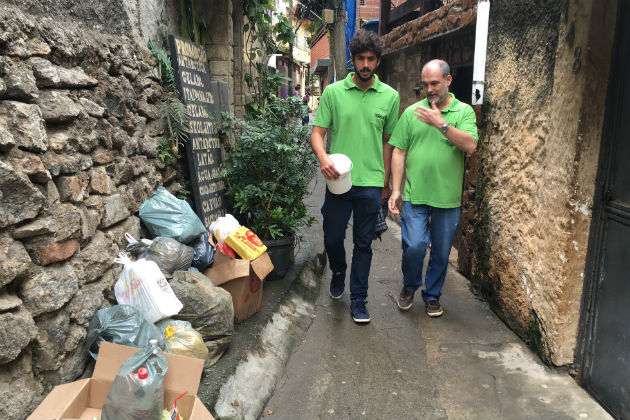 |
| WHO/N. Alexander |
Can tiny bacteria help stop the spread of disease?
Mosquitoes kill an estimated 700 000 people a year. If infected with viruses that cause diseases like chikungunya, dengue and Zika, mosquitos can transmit them to humans in one bite. Researchers have now pilot-deployed a new technique to control diseases transmitted by mosquitoes by making use of nature. It is one of the new tools WHO recommends for pilot deployment as a response to Zika virus. Rita Ramos lives in Jurujuba, a fishing community of about 1000 people, across Guanabara Bay from Rio de Janeiro, Brazil. She is an administrator for her community, and her husband works in a construction materials shop. Since June 2016, she has been taking part in a project to help control a killer in her community: mosquitoes.  | WHO/N. Alexander
. |
Researchers at Monash University in Australia (with the participation of Dr. Luciano Moreira from Brazil's federal research centre, Funda�ao Oswaldo Cruz, or, Fiocruz), have discovered that mosquitoes artificially infected with a bacterium called Wolbachia do not transmit dengue, chikungunya and Zika as easily. Wolbachia bacteria exist naturally in 60% of common insects. This innovative approach to control mosquito-transmitted diseases was brought to Brazil by Fiocruz in 2012. Initially a dengue control project, it began in a small community close to the international airport in 2014. In the current phase of the project, now in Jurujuba - Niteroi, the researchers are breeding and releasing mosquitoes with Wolbachia bacteria. They aim to see how well these mosquitoes, by mating with wild mosquitoes, can pass the bacteria on to the next generation of mosquitoes, therefore creating populations of mosquitoes that cannot transmit deadly viruses.  | WHO/N. Alexander |
In early 2015, Rita met Jorge Pedrosa (center) through her community health worker. Jorge, who coordinates activities that engage communities in the dengue control project, explained the research project where this special type of mosquito is bred and released directly into the community. "At first, Jorge came to explain the same thing every week," says Rita. "We did not understand the project. We also wanted to know why they had chosen our community." She is one of 28 households in this part of Jurujuba which participate in the project. Rita and Jorge are joined by Gabriel Sylvestre Ribeiro (right), entomology coordinator for the project.  | WHO/N. Alexander |
Rita keeps this white bucket under her front stairs. It contains a small packet of mosquito eggs, a few pellets of fish food and water. Together, these form an ideal breeding atmosphere for the Wolbachia-infected mosquitoes. Gabriel and colleagues come to inspect and refresh the contents every two weeks. Rita says she has not noticed a higher number of mosquitoes in the community, and her point of view has changed. "When I see them I don't kill them. I let them fly. I am not afraid of them... Now, to me, it is like a privilege to have the mosquitoes here." 
| WHO/N. Alexander |
Rita played an important role in reaching out to the community before the project was rolled out. First, researchers from Fiocruz, the research institute, talked to community health workers to answer their questions about the project, then asked them to help make contact with influential and respected community members. They held meetings and explained all aspects of the project. Jorge says, "we explained the history of the project, about diseases like dengue and Zika. We presented the science. We let them know this project would be going on in other neighborhoods, too, including affluent neighborhoods. We were very transparent. We did not promise anything."  | WHO/N. Alexander |
Jorge and Gabriel visit Jurujuba every two weeks, as well as other pilot communities. These communities, along with others in Australia, Indonesia and Viet Nam, are gathering valuable information that will help researchers understand how well this method works to control disease. These countries are also part of the global programme that is aiming to eliminate dengue. WHO is encouraging research into this new method of mosquito control. In March 2016, the WHO Vector Control Advisory Group recommended the pilot deployment of Wolbachia-carrying mosquitoes to test the method's effectiveness, to be followed by independent robust monitoring and evaluation. "Wolbachia bacteria are not a silver bullet," says Gabriel. "But it is really promising." Results from Jurujuba and other Brazilian communities are expected to be folded into wider results.  | WHO/N. Alexander |
Fiocruz is one of several partners working to pilot-deploy Wolbachia-infected mosquitoes. Other partners include the University of Antiochia, Medellin in Colombia, and Professor Ivan Dario Velez. For more information, see this interview with Scott O'Neill, professor and dean of science at Monash University in Australia, who leads a team of researchers who discovered that the ability for viruses to grow in the Aedes aegypti mosquito infected with Wolbachia was significantly reduced.
|

